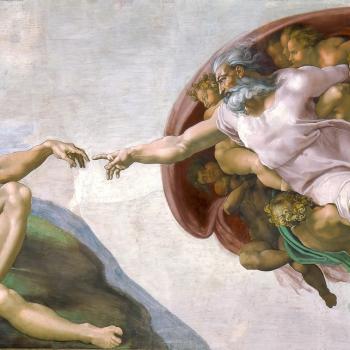As communal creatures, we humans reach out daily to others and to the world around us. Our relationships exist as an interdependent web – we relate to, love and feel compassion for ourselves, for others (as individuals and within communities), and for all sentient beings and the universe itself. Each type of relationship seems to logically grow from and through the others. A heightened awareness in one, has the capacity to transform the others. But, in looking at this “trinity” of relationships, I find myself asking, why is a loving, compassionate response to others and to our world seemingly easier? And, why is a loving, compassionate response to ourselves so much harder?
My friend Mary is an amazing healer and Reiki master teacher. She once counseled me to keep in mind that the best decisions are made, when we consider all the possibilities from all possible angles. She told me, in a reference to the Native American tradition, that in order to do this, I must, “Bring all parts of myself to the teepee fire.”
Without a second’s hesitation, I reacted, “Oh, I don’t think I want to do that.” My reaction was telling. I was surprised at my expression of fear. That’s when I realized that I had left some of myself “outside.” She soothed me with the words, “They don’t have to speak, just invite them in to sit with you in the silence.” I did and they arrived as shades. And, I began to think about how parts of ourselves get left “outside.”
Identity Theft
Just the words “identity theft” can raise our anxiety level. We do everything we can to protect ourselves against it. There are companies that will help us avoid it or clean up the mess after it has happened.
We can think about identity theft in a broader context. It began long before someone coined that name. This is a much more subtle form of identity theft. It requires our buy-in.
It begins within our mothers’ womb. We hold the perfect Divine vibration which is the God and love within us. There is a dim glow shining through from our new world to be. As we begin to live and grow in intimate concert with our mothers, we are literally awash in her world, in every way that matters: physically, emotionally, mentally and spiritually.
We feel what she feels, we experience what she experiences, we know her thoughts, about her world, about her joys, her sorrows, her fears, and most importantly, her feelings for us. Subtle changes begin to happen in us, as we seek to merge with our new environment. . . . Welcome to incarnation, to life.
Annabelle’s Story
About 4 years ago I was sitting in an outdoor shopping mall surrounded by new planters literally overflowing with flowers, of all sizes and shapes, a riot of color, when I noticed a tiny young girl of perhaps 4 years old rapidly approaching on my left. She had honey-blonde hair, with a bit of curl, and was wearing a summer pinafore and sandals. She was running as fast as she could, in what appeared to be a dance between her joy at seeing the flowers and the magnetic attraction they held for her. Child and flowers were literally being “drawn together.”
Annabelle stretched out her small arms in an arc of love and greeting to all that she beheld, sublimely smiling, as though she had missed them terribly and was supremely happy to be seeing them again. She took a deep breath into herself – a breath of the flowers and of herself in a perfect union. She then began to greet the flowers one by one. . . and I began to see the flower faces myself. I wondered if she would tire of this eventually, because there were so many flowers. But I was wrong.
By then her mother, father and baby brother had caught up and along with them an assortment of aunts, uncles, grandparents and cousins. One of the aunts whispered to the mother and father, “What’s Annabelle doing?” The parents answered a bit sheepishly, “She’s talking to the flowers.”
The group watched Annabelle with confused and questioning expressions. I appreciated the fact that on their own, her parents had allowed her this great and holy pleasure. When told it was time to go, without missing a beat, Annabelle began to take her leave of her flower friends one by one. Someone reached for Annabelle’s hand to guide her away, but she broke free twice to take leave of a flower she had forgotten.
What Life “Teaches” Us
We learn many things as children. Someone will tell Annabelle that her actions are silly, childish, or strange, and don’t make “sense.” She will learn about appropriate behavior for home, for school, for church. She will learn which parts of her unique personal expression are “acceptable” or “unacceptable” (to her family, tribe, church or country). And, she will begin to leave something of herself “outside.”
Our identification with self (small s) and with our tribe is born early and grows stronger with each passing year. Our openness and trust fades. We gradually adopt more and more layers of protection, masks of ego and personality, and perhaps even risk-averse behaviors. If we stand outside the box, we risk derision, judgment, labeling, dismissiveness, scorn, and ultimately, the withdrawal of affection. We develop a need to please and a fear of anger or disapproval.
Eventually, we may learn to turn these criticisms initiated by others, inward toward ourselves. We may reject parts of ourselves. The self-critic says, “I’m not good enough, smart enough, organized enough, athletic enough, clever enough, talented enough, tall enough, handsome enough. We total up all of these things and come up with, “I am not worthy.”
We can seek to quiet these critical voices, to re-structure our thinking, but I have come to think that it’s better to let these voices speak out loud, or even yell, if need be to gain our attention. I believe that it is from our full listening to these voices, from the experiencing of their pain, that true compassion for self will arise.
Eventually, we carry the yoke of every conceivable expectation of ourselves around our necks – the yoke of spouse, family, gender, country, religion, boss, teacher, and on and on, it goes. We are prisoners. We know something is wrong. And one day we wake up and say to ourselves, “I can’t do this, like this, anymore.”
Speaking from her own experience, Anais Nin (20th century Franco-Cuban writer) says, “There came a time when the risk to remain tight in the bud was more painful, than the risk it took to blossom.” For better or worse, we have arrived at the crossroads. The long road back will become an intellectual, emotional and spiritual search for the forgotten, true, whole Self.
Entering the dark night
And, so, we go underground to meet ourselves, to face our fears, into the dark cave, into the unconscious, into the “dark night.” Joan Borysenko psychologist and pioneer in integrative medicine describes the progression of the dark night. It begins with the simple recognition of the arrival of the dark night. She describes this as a separation from the known. This might be expressed emotionally as: “I am a stranger in my life.”
In conjunction with this, you recognize, you know, deep within yourself, that there is no going back. You have separated from what was, but you do not yet know, what will be.
And so, you look at the inside and the outside. You re-assess everything in your life– friends, work, relationships, environment, your ideals and your values. You keep what issues forth from love, you drop what issues forth from fear, you embrace the expansions and reject the constrictions. You embark on a journey into becoming conscious.
You may know your shortcomings, but feel powerless to change your behavior. That’s OK. Every way that you find yourself to be will come to the teepee fire. You may not pass all of them the pipe of peace right away, they may only sit in silence with you. But they came, when and because you called.
This phase brings a shedding, a cutting away of fear. We strip away the unnecessary comparisons, the blame of ourselves and others, and slowly by slowly, begin to recognize the intricate web of circumstances, which we can never fully comprehend, that creates second by second — the world in which we find ourselves. And we are struck with awe.
In the words of Meister Eckhart (13th -14th century German, theologian, philosopher and mystic), “God is not found in the soul by adding anything, but by a process of subtraction.” We are seeking nothing less than our Divine essence. We are seeking God.
So, how might we do that? Meditation, silence, prayer, time spent in Nature. These practices allow us to hear our inner voice, to communicate with that part of ourselves which abides in Divinity.
The Sculptor’s Tools
Michelangelo writes,“I saw the angel in the marble and carved until I set him free.” So, what are the tools of the “spiritual sculptor?”
Faith – Surrender to the higher wisdom, the higher good, knowing that with our limited capabilities we will likely never know the full complexity of.
Truth – Be present to what is, to what you are feeling in the moment. Don’t feel that you have to change it or fix it.
Discernment – Recognize your mentors, those who are nurturing to be with. Know the enemy from the ally, but learn from them both.
Curiosity – Embrace a child’s way to approach life. It opens us to awe and wonder.
A sense of humor – If the choice is, I don’t know whether to laugh or cry – I’d rather laugh and invite the universe to laugh with me.
Conclusion
In these complicated times, the creative impulse of the universe is drawing/requiring greater and greater consciousness from all of us. Unfortunately, we are fearful and still cling to the illusion. Be clear that what shatters is illusion, the clouded glass through which we have learned to look, evaluate, and act. The glass clouded by every yoke we have agreed to carry. Beneath everything we have been told about who we are, who we need to be, we will find God. Then we can welcome back all those parts of ourselves which we have abandoned. When we know and accept who we are, who we are is easy to love.













